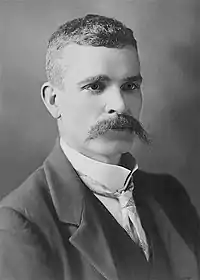Watson Ministry
The Watson Ministry (Labour) was the 3rd ministry of the Government of Australia, and the first national Labour government formed in the world. It was led by the country's 3rd Prime Minister, Chris Watson. The Watson Ministry succeeded the First Deakin Ministry, which dissolved on 27 April 1904 after Labour withdrew their support and Alfred Deakin was forced to resign. The ministry was replaced by the Reid Ministry on 17 August 1904 after the Protectionist Party withdrew their support over the Conciliation and Arbitration Bill.[1]
| Watson Ministry | |
|---|---|
3rd Ministry of Australia | |
.jpg.webp) Group photo of the Watson Ministry with Governor-General Lord Northcote. | |
| Date formed | 27 April 1904 |
| Date dissolved | 17 August 1904 |
| People and organisations | |
| Monarch | Edward VII |
| Governor-General | Lord Northcote |
| Prime Minister | Chris Watson |
| No. of ministers | 8 |
| Member party | Labour |
| Status in legislature | Minority government (Protectionist support) |
| Opposition party | Free Trade |
| Opposition leader | George Reid |
| History | |
| Legislature term(s) | 2nd |
| Predecessor | First Deakin Ministry |
| Successor | Reid Ministry |
Billy Hughes, who died in 1952, was the last surviving member of the Watson Ministry; Hughes was also the last surviving member of the First Fisher Ministry, Third Fisher Ministry, Second Hughes Ministry and Third Hughes Ministry.
Ministry
| Minister | Portrait | Portfolio | |
|---|---|---|---|
| Hon Chris Watson (1867–1941) |
 |
||
| Hon Billy Hughes (1862–1952) MP for West Sydney |
 |
||
| Hon H. B. Higgins KC (1851–1929) MP for Northern Melbourne |
.jpg.webp) |
||
| Hon Lee Batchelor (1865–1911) |
.jpg.webp) |
||
| Hon Andrew Fisher (1862–1928) |
 |
||
| Hon Anderson Dawson (1863–1910) Senator for Queensland |
.jpg.webp) |
||
| Hon Hugh Mahon (1857–1931) MP for Coolgardie |
.jpg.webp) |
||
| Hon Gregor McGregor (1848–1914) Senator for South Australia |
 |
||
References
- "Ministries and Cabinets". Parliamentary Handbook. Parliament of Australia. Retrieved 17 September 2010.
- The Protectionist Party member Higgins accepted office (with Alfred Deakin's permission) as Attorney-General since the Labour Party did not have a lawyer in its parliamentary ranks with the exception of Billy Hughes, who had recently admitted as a barrister but who was already serving in another portfolio and was not viewed as qualified for the post. It was the only time a non-member of the Labour Party has served in a Labour ministry.
